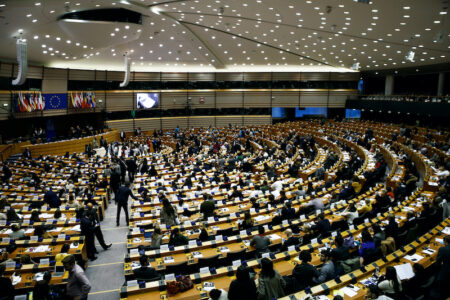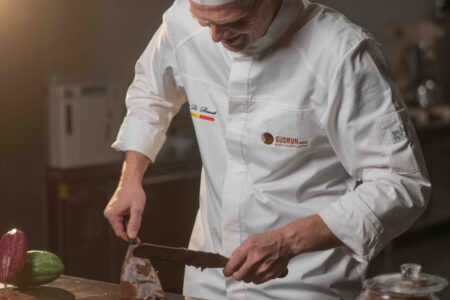Exclusive: Eyes of the industry trained upon the fifth edition of the World Cocoa Conference

This year’s World Cocoa Conference is gearing-up to be staged in the Belgian capital, Brussels. Editor Neill Barston speaks exclusively to Michel Arrion, executive director of the International Cocoa Organisation (ICCO), which is behind the key global event
Perhaps the most compelling moment from the last World Cocoa Conference held a distant-seeming six years ago, was an enduring image of young school children making a poignant and striking appearance on its main stage. (See our exclusive video version of the interview here).
Each youngster brandished individual letters that spelt out a large combined sign issuing a plea to ‘Stop child labour’ and pledged to stop eating chocolate until the issue is resolved.
It’s a a message that event sponsors including Mars Wrigley and delegates alike appeared to earnestly take to heart in acknowledging the shocking statistics behind core supply chains in West African nations of Ghana and Ivory Coast.
But over half a decade on, now that many of the young people who were up on stage in 2018 may be coming to an end of their schooling, how much has the situation actually changed?
Certainly, according to the last reliable figures from the US department of labour several years ago, there were 1.56 million young people exposed to the worst forms of child labour in Ghana and Ivory Coast.
As organisations including Fairtrade have noted, the crisis has, if anything, continued to worsen in the wake of the Covid-19 pandemic, as cocoa communities have grappled with multiple challenges.
These have included poor harvests hit by extreme weather, spiralling costs of fertilisers vital to crop health, as well as other external factors such as the ongoing war in Ukraine that has caused major disruption to established global logistics chains.
While farmers in both Ghana and Ivory Coast have received a modest pay rise within the past six months off the back of sustained high cocoa prices in excess of $5000 a tonne on New York and London stock markets, many are reportedly still earning markedly poor wages of $1-2 a day, some way below UN poverty definition levels.
Seeking a solution
It’s these disproportionately poor wages that result in many smallholder cocoa-farmers making up the bulk of the industry are earning, that result in them being unable to afford adult labourers and instead turn to their own children for help with their key harvesting tasks.
As high-profile TV documentaries in the past year in the US and the UK have shown, children as young as 8 or 9 upwards are being used for hazardous tasks such as machete work picking crops, which lies at the heart of concerns in the industry.
So it is perhaps only fitting that the issue of farmer pay – so often placed as a secondary issue for many industry events over the years, is being placed front and centre at this year’s World Cocoa Conference, taking place in Brussels, Belgium.

The event, held by the International Cocoa Organisation (ICCO), is set to be staged between April 21-24, will take place under a collective banner of ‘paying more for sustainable cocoa.”
Among its confirmed keynotes for this year’s event include Catherine Entzminger, of the European Cocoa Association, Timothy S McCoy, of Hershey, Joseph Boahen Aidoo of Ghana’s Cocoa Board, Harper McConnell, vice president of cocoa sustainability at Mars, and Chris Vincent, the president of the World Cocoa Foundation, and many others besides.
Exciting programme
Speaking exclusively to Confectionery Production, Michel Arrion, executive director of organisers, the ICCO, explained that while there remain significant tests in the market, he felt that through collaborative action, then the key issues of pricing in the market can be solved.

Michel Arrion, executive director, ICCO. Pic: ICCO
Discussing this year’s event, he said: “I am excited by this year’s conference, which will be opened by the Queen of Belgium, so there will be high level representation there, including from the EU Commission, and from producing countries, from both Africa and Latin America.
“I am also very excited by the main theme, which will be addressing how to achieve a living income through sustainability and through higher prices, and paying more and paying better. There will be 12 panels for the event, including more technical focuses on themes relating to the three chapters of the International Cocoa Agreement, looking at sustainable cocoa, market developments, and markets and governance, which are linked to discussions on living income. So, all together, this is a very focused programme,” explained the ICCO’s executive director of the upcoming event.
As he acknowledged, the key industry gathering’s staging has been heavily disrupted due to Covid-19, with the last event scheduled to have taken place in Bali back in 2020 was cancelled due to the unprecedented measures of global lockdown.
While the pandemic may seem like some way in the past already, its shadow has lingered-on, and there is little doubting its impact on many communities, including with the cocoa sector.
Though this issue, and many more besides offer considerable tests, the programme for the World Cocoa Conference is aiming to build consensus on the way forward for a truly sustainable industry. Solving the major issue of paying farmers remains fundamental to this situation.
Reflecting this, one of the key panels for the first day of the event is entitled “The Quest for the living income of smallholder farmers,” which will be led by Alex Arnaud Assanvo, of the CIGHCI cocoa organisation between the Ivory Coast and Ghana governments.
Notably, as Arrion continued on the core theme of the event, he asserted that situation was in fact relatively straightforward in that the sector had to pay more for cocoa supplies to ensure it is delivered to high ethical sourcing standards.
As Confectionery Production has previously noted, this is a position that the ICCO director has maintained consistently, having formerly stated that the sector, and consumers alike, should become accustomed to paying more for products if we are to see the cocoa industry thrive into the future.
“One of the most important components of a living income is the price that farmers are selling their cocoa, which is known as the farmgate price. So will give a lot of emphasis this – if you want sustainable cocoa, then you have to pay for it, or at least integrate all the costs of sustainability into the price,” explained the director, who recently addressed this theme at the Chocoa cocoa and chocolate event in Amsterdam.
As he explained, the issue of cocoa prices had previously seemed ‘taboo,’ but he noted it was at least filtering into a fair number of the discussions there, as a crucial issue for agricultural communities. It’s not the first time in his experience that major challenges have arisen that have require a combination of determination, collaboration and pragmatism to resolve.
Long-term interest
Reflecting on his own lengthy career, which has included leading the ICCO for the past five years, he revealed that his varied experiences had certainly contributed towards forming an assessment on major challenges facing the industry today. While there may well have been many tests along the road, what is it that he has found most enjoyable in his role?
“I started my professional career – 40 years ago, in the dairy industry, and the company I was working for had most of its clients in the agri-food sector, especially pastry, biscuits, ice cream industries; the cocoa industry shares the same types of clients. So, I took great pleasure in working again in a sector so closed to the value chain I knew best.
“In cocoa, the chocolate industry is rather sophisticated, with two steps, and two different industries: (1) the grinders producing all kinds of different semi-finished products – there are many different sorts of powder, of butters, etc. So, with hundreds of different recipes for chocolate / confectionery / snacking, it has offered even more variety,” explained the executive director.
Significantly, he also gained nearly two decades of experience working for various branches of the European Commission, which have further enriched his working life. But how has this previous experience working within the heart of developing European policies helped in your role with the ICCO?
“My previous work in the EU Commission, especially as EU Ambassador was to build consensus among EU member states, and to engage in policy dialogue with the host countries.
“These two main aspects are very important within ICCO: building consensus, and facilitating policy dialogue between exporting and importing countries,” added the executive director of his diplomatic service experience.



